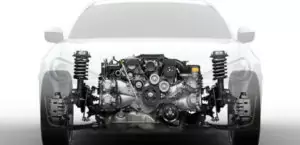The 2.0-liter VW CRMB or Golf 7 2.0 TDI diesel engine has been assembled by the company since 2012 and installed on a number of its mass models such as the Volkswagen Golf, Skoda Octavia and Seat Leon. This diesel has become widespread thanks to the installation in the third generation Octavia.
The EA288 series also includes: DCXA, CRLB, CRMB, DETA, DBGC, DFGA, DFBA, DAUA.
Specifications
| Production years | since 2012 |
| Displacement, cc | 1968 |
| Fuel system | Common Rail |
| Power output, hp | 150 |
| Torque output, Nm | 320 |
| Cylinder block | cast iron R4 |
| Block head | aluminum 16v |
| Cylinder bore, mm | 81 |
| Piston stroke, mm | 95.5 |
| Compression ratio | 16.2 |
| Features | DOHC |
| Hydraulic lifters | yes |
| Timing drive | belt |
| Phase regulator | no |
| Turbocharging | Mahle BM70B |
| Recommended engine oil | 5W-30 |
| Engine oil capacity, liter | 4.6 |
| Fuel type | diesel |
| Euro standards | EURO 5/6 |
| Fuel consumption, L/100 km (for Volkswagen Golf 2017) — city — highway — combined |
5.3 3.9 4.4 |
| Engine lifespan, km | ~330 000 |
The engine was installed on:
- Seat Leon 3 (5F) in 2015 – 2020;
- Skoda Octavia 3 (5E) in 2012 – 2020;
- Volkswagen Golf 7 (5G) in 2014 – 2020.
Disadvantages of the VW CRMB engine
- At the moment, no serious weaknesses have been identified in this diesel engine;
- Modern fuel equipment does not tolerate bad fuel, and repairs are expensive;
- As with many diesel engines, the EGR valve quickly clogs with soot;
- According to the regulations, the timing belt serves 210 thousand km, but the pump can give up earlier;
- It is recommended to pour oils with VW 507.00 approvals, otherwise the particulate filter does not last long.






